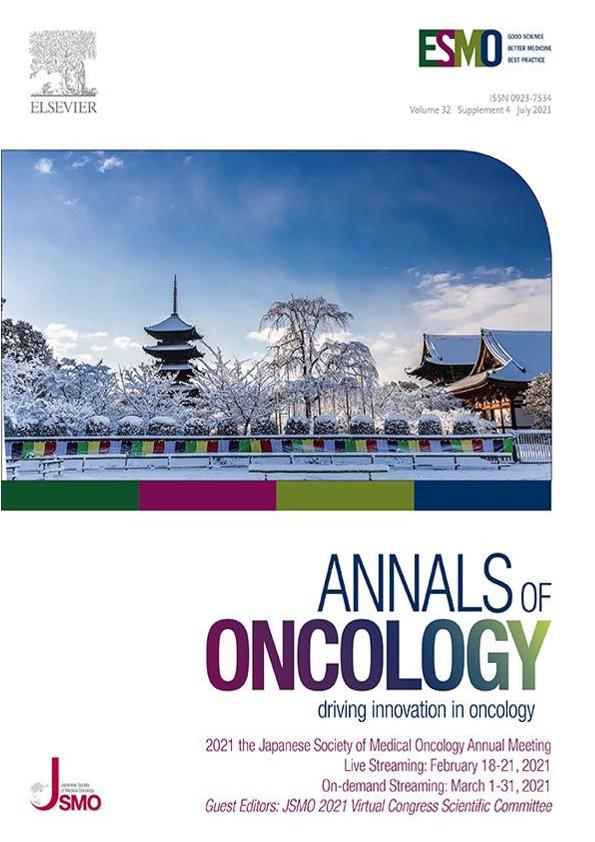Mostrar el registro sencillo del ítem
dc.contributor.author
Carriere, Pedro Matias

dc.contributor.author
Novoa Díaz, María Belén

dc.contributor.author
López Moncada, Fernanda

dc.contributor.author
Zwenger, A.
dc.contributor.author
Contreras, H.
dc.contributor.author
Calvo, Natalia Graciela

dc.contributor.author
Gentili, Claudia Rosana

dc.date.available
2022-11-22T03:32:04Z
dc.date.issued
2021
dc.identifier.citation
PTHrP and SPARC expressions in human colorectal cancer: An in silico analysis; ESMO World Congress on Gastrointestinal Cancer 2021; Modalidad virtual; Estados Unidos; 2021; 158-158
dc.identifier.issn
0923-7534
dc.identifier.uri
http://hdl.handle.net/11336/178414
dc.description.abstract
PTHrP is a paraneoplastic factor involved in the progression and theacquisition of the aggressive behavior of different types of tumors. Employing in vitroand in vivo models of colorectal cancer (CRC), our research group observed thatPTHrP promotes cell survival, proliferation, migration, angiogenesis, epithelial tomesenchymal transition (EMT) program, cancer stem cell (CSC) phenotype, andchemoresistance through different signaling pathways. Recently, in HCT116 cellsderived from CRC we found that PTHrP acts increasing SPARC protein expression, arelevant protein involved in CRC progression. Moreover, SPARC treatment on HCT116cells potentiated PTHrP effects. In vivo model, PTHrP also increased SPARC expression. Based on these findings, the aim of this work is explore the clinical relevance ofPTHrP and SPARC tumor expression in human CRC using in silico analysis.Methods: Cytoscape 3.8.2 stringApp was employed to visualize molecular networksfrom the STRING database related to CRC, and proteins associated with prognosticfactors were selected to analysis. Using STRING Enrichment App, the proteins networks (PN) merged were compared to establish enrichment. Finally, in silico tool andonline data sets (GEPIA2 and STRING 11.0) were used to explore the association ofPTHrP and SPARC and their prognostic value in 362 CRC human samples.Results: In GEPIA2 database, a significant correlation between the expressions ofPTHrP and SPARC in CRC was observed (p-value¼0.01). Also, SPARC expression washigher in CRC respect to colorectal normal samples (p-value¼0.01). In the same way,SPARC expression was significantly higher in CRC advanced than in early disease.Employing STRING 11.0 database, we observed a strong association between PTHrPand several oncogenic markers (CDH2, CD44, VIM, among others) that previouslywere evaluated in vitro by us linked through SPARC with a Protein-Protein interactionenrichment (p-value 0.95). This PN was merged with the PN obtained from the search?colorectal cancer? with a high disease score (SD> 3.2). From this analysis, VEGFA wasemerged as a central nexus between PTHrP and SPARC proteins. Finally, GEPIA2 wasused to evaluate the survival rate in CRC patients that express PTHrP and/or SPARC.No significant impact in overall survival was found taken account high or lowexpression of each protein.Conclusions: In CRC tumor samples, a strong relationship between PTHrP and SPARCexpression was found, suggesting that both proteins could be involved in the progression of the disease. Despite VEGFA was also associated with PTHrP/SPARC, morestudies are necessary to evaluate their clinical relevancy.
dc.format
application/pdf
dc.language.iso
eng
dc.publisher
Elsevier

dc.relation
https://www.esmo.org/meeting-calendar/past-meetings/esmo-world-gi-2021
dc.rights
info:eu-repo/semantics/openAccess
dc.rights.uri
https://creativecommons.org/licenses/by-nc-sa/2.5/ar/
dc.subject
CANCER
dc.subject
IN SILICO ANALYSIS
dc.subject.classification
Bioquímica y Biología Molecular

dc.subject.classification
Ciencias Biológicas

dc.subject.classification
CIENCIAS NATURALES Y EXACTAS

dc.title
PTHrP and SPARC expressions in human colorectal cancer: An in silico analysis
dc.type
info:eu-repo/semantics/publishedVersion
dc.type
info:eu-repo/semantics/conferenceObject
dc.type
info:ar-repo/semantics/documento de conferencia
dc.date.updated
2022-11-09T15:30:32Z
dc.journal.volume
32
dc.journal.number
S3
dc.journal.pagination
158-158
dc.journal.pais
Reino Unido

dc.journal.ciudad
Reino Unido
dc.description.fil
Fil: Carriere, Pedro Matias. Consejo Nacional de Investigaciones Científicas y Técnicas. Centro Científico Tecnológico Conicet - Bahía Blanca. Instituto de Ciencias Biológicas y Biomédicas del Sur. Universidad Nacional del Sur. Departamento de Biología, Bioquímica y Farmacia. Instituto de Ciencias Biológicas y Biomédicas del Sur; Argentina
dc.description.fil
Fil: Novoa Díaz, María Belén. Consejo Nacional de Investigaciones Científicas y Técnicas. Centro Científico Tecnológico Conicet - Bahía Blanca. Instituto de Ciencias Biológicas y Biomédicas del Sur. Universidad Nacional del Sur. Departamento de Biología, Bioquímica y Farmacia. Instituto de Ciencias Biológicas y Biomédicas del Sur; Argentina
dc.description.fil
Fil: López Moncada, Fernanda. Universidad de Chile. Facultad de Medicina.; Chile
dc.description.fil
Fil: Zwenger, A.. Centro de Estudios Clinicos SAGA; Chile
dc.description.fil
Fil: Contreras, H.. Universidad de Chile. Facultad de Medicina.; Chile
dc.description.fil
Fil: Calvo, Natalia Graciela. Consejo Nacional de Investigaciones Científicas y Técnicas. Centro Científico Tecnológico Conicet - Bahía Blanca. Instituto de Ciencias Biológicas y Biomédicas del Sur. Universidad Nacional del Sur. Departamento de Biología, Bioquímica y Farmacia. Instituto de Ciencias Biológicas y Biomédicas del Sur; Argentina
dc.description.fil
Fil: Gentili, Claudia Rosana. Consejo Nacional de Investigaciones Científicas y Técnicas. Centro Científico Tecnológico Conicet - Bahía Blanca. Instituto de Ciencias Biológicas y Biomédicas del Sur. Universidad Nacional del Sur. Departamento de Biología, Bioquímica y Farmacia. Instituto de Ciencias Biológicas y Biomédicas del Sur; Argentina
dc.relation.alternativeid
info:eu-repo/semantics/altIdentifier/doi/https://doi.org/10.1016/j.annonc.2021.05.227
dc.relation.alternativeid
info:eu-repo/semantics/altIdentifier/url/https://www.sciencedirect.com/science/article/pii/S0923753421014162?via%3Dihub
dc.conicet.rol
Autor

dc.conicet.rol
Autor

dc.conicet.rol
Autor

dc.conicet.rol
Autor

dc.conicet.rol
Autor

dc.conicet.rol
Autor

dc.conicet.rol
Autor

dc.coverage
Internacional
dc.type.subtype
Congreso
dc.description.nombreEvento
ESMO World Congress on Gastrointestinal Cancer 2021
dc.date.evento
2021-06-30
dc.description.ciudadEvento
Modalidad virtual
dc.description.paisEvento
Estados Unidos

dc.type.publicacion
Journal
dc.description.institucionOrganizadora
European Society for Medical Oncology
dc.source.revista
Annals Of Oncology

dc.date.eventoHasta
2021-07-03
dc.type
Congreso
Archivos asociados
